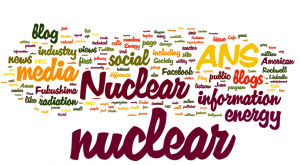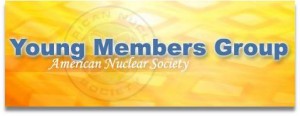News you can’t use
In new media and old, time must be devoted to finding and conveying accurate information, no matter how short the news cycle.
-3 2x1.jpg)
A message from Curtiss-Wright
High-Temperature neutron flux detectors for Generation IV reactors and SMRs
In new media and old, time must be devoted to finding and conveying accurate information, no matter how short the news cycle.
Former NRC chairman is honored at American Nuclear Society national meeting
As President-Elect of the American Nuclear Society, I welcome my fellow ANS members and non-members to the 2011 June conference!
Travel Mugs Available at June ANS Meeting
The history of the development of peaceful uses of nuclear energy is accentuated by a number of significant emotional events. Some have been distinctly positive; the first man-made self-sustaining fission reaction, the first electricity generated by atomic energy, feats accomplished by the first nuclear powered naval vessels, the invention of life-saving nuclear medicine techniques, etc. During and following each of these milestones our collective understanding of the technology has continued to evolve and mature with increased knowledge and experience.
Perhaps one of the more enduring cartoons that relates to the quality of information on the Internet is the one that states, "On the Internet no one knows you are a dog." It shows a drawing of two dogs sitting in front of a computer terminal. Unfortunately, the cartoon is copyrighted material so it can't be reposted here, but you can see it here along with many variations. The point of the cartoon is that words and images on the screen can come from anywhere and anyone. Clearing up misconceptions and outright falsehoods about nuclear energy since the March 11 Fukushima earthquake and tsunami is getting more attention these days. Problems range from not mainstream journalists not understanding the technical issues to people who are publicity crazed fear mongers out to get their face on a video.
Clearing up misconceptions and outright falsehoods about nuclear energy since the March 11 Fukushima earthquake and tsunami is getting more attention these days. Problems range from not mainstream journalists not understanding the technical issues to people who are publicity crazed fear mongers out to get their face on a video.
Become an ANS Facebook Friend
In the weeks and months following the events at the Fukushima plant in Japan, the American Nuclear Society's Social Media listserv has become a headquarters for sharing information, ideas, and strategies about how to combat misinformation about nuclear energy. This active forum is facilitated by Dan Yurman, who through this effort has opened a new door for collaboration between communicators from all corners of the nuclear community. Many on this list have voiced concerns that the industry response to Fukushima has not yet managed to transition from defensive to offensive, in terms of public outreach.
 Deadlines are approaching for the opportunity to take the 2011 Nuclear Professional Engineer (PE) National Council of Examiners for Engineering and Surveying (NCEES) examination, required by all state registration boards for a PE license. The next administration of the NCEES/ANS Nuclear Engineers exam will be October 28, 2011.
Deadlines are approaching for the opportunity to take the 2011 Nuclear Professional Engineer (PE) National Council of Examiners for Engineering and Surveying (NCEES) examination, required by all state registration boards for a PE license. The next administration of the NCEES/ANS Nuclear Engineers exam will be October 28, 2011.
The American Nuclear Society's 2011 Annual Conference-Seizing the Opportunity: Nuclear's Bright Future-will take place June 26-30 in Hollywood, Fla. Discount registration is available through June 3.
 The basic thesis of a post I wrote in January was that the Chernobyl accident was far enough in the past that the younger generation in the nuclear industry did not have the first-hand memories of the experience, and therefore lacked some of the emotional understanding of the event. I suggested that there should be a conscious effort to pass on how Chernobyl and Three Mile Island affected the culture of the industry.
The basic thesis of a post I wrote in January was that the Chernobyl accident was far enough in the past that the younger generation in the nuclear industry did not have the first-hand memories of the experience, and therefore lacked some of the emotional understanding of the event. I suggested that there should be a conscious effort to pass on how Chernobyl and Three Mile Island affected the culture of the industry.
Many American Nuclear Society members and groups across the United States have been energetically involved in the media, in their communities, and on campus during the recent events at the Fukushima plant. These members and groups have provided their knowledge and expertise to improve the accuracy of public discussions about the Fukushima events during a time when it has been sorely needed. This effort continues around the country as ANS members provide accurate, scientifically-sound information in front of TV cameras, at campus symposia, on local radio, in newspapers and journals, and by many other ways.
As many of you know, there is a group of 160 or so people that participates in a sort of online party discussion about nuclear. Basically, anyone in the list can send an e-mail that goes to everyone on the list. Anyone can respond and everyone can see it. It works a bit like a huge cocktail party in that you can participate-or not-in any given conversation. This list serves as a sounding board for ideas, information gathering as there are many technical experts in various areas of nuclear energy, and support for those who are out in the larger world communicating about nuclear.
In the days since Japan's earthquake and tsunami combined to create the situation at Fukushima, nuclear professionals across the country have been united in our deep concern over the events in Japan and have contributed countless hours working to ensure that information provided to the public and media was based on fact and reason rather than hysteria and misinformation. I want to take this opportunity to express my appreciation to the many ANS members who stepped forward to support the efforts of the Society in this time of great need.
This article was originally scheduled to appear on March 14.
Last week, the Union of Concerned Scientists (UCS) published a report written by Doug Koplow, titled Nuclear Power: Still Not Viable Without Subsidies, which generated a good deal of discussion and encouraged some observers to parrot the conclusions without reading the document very carefully.